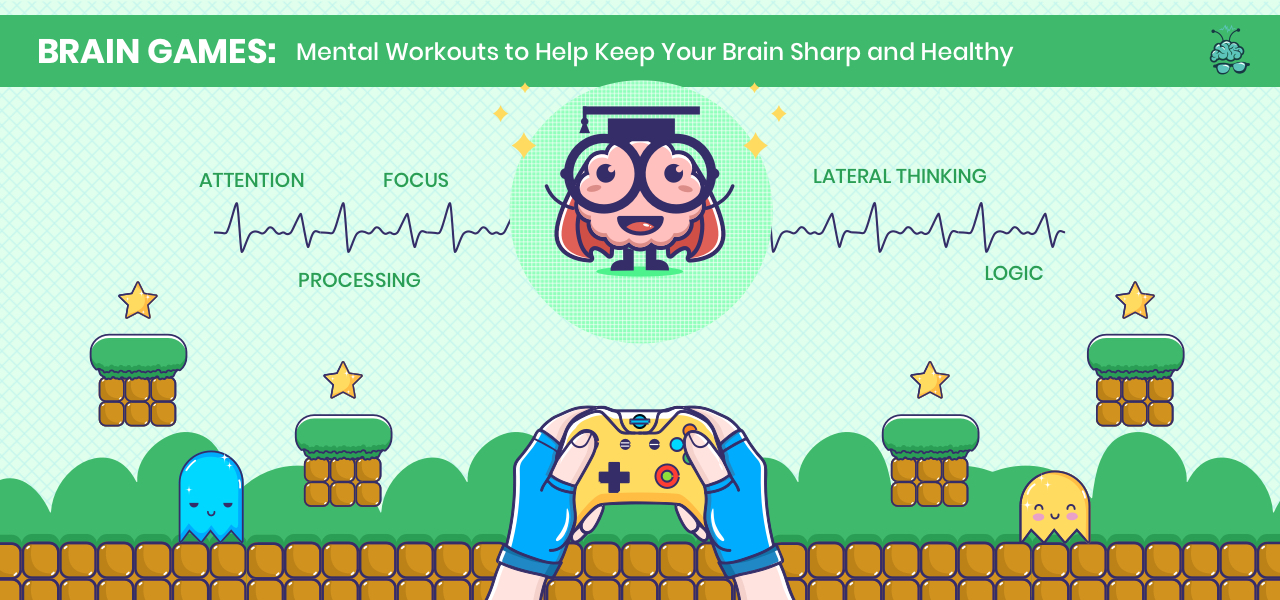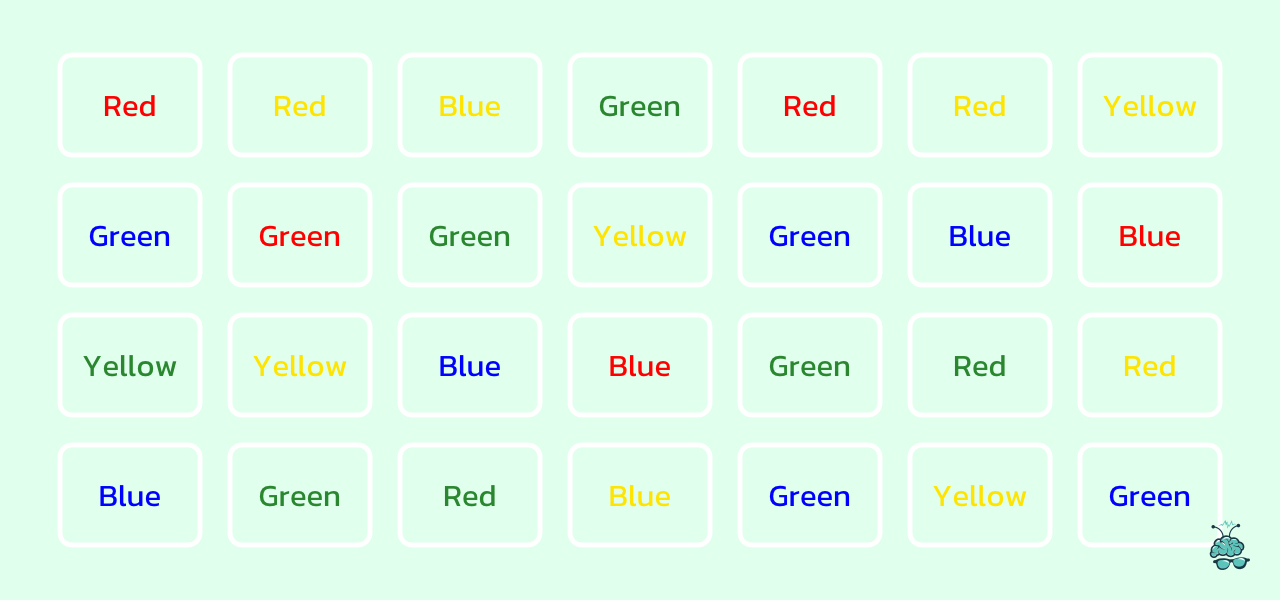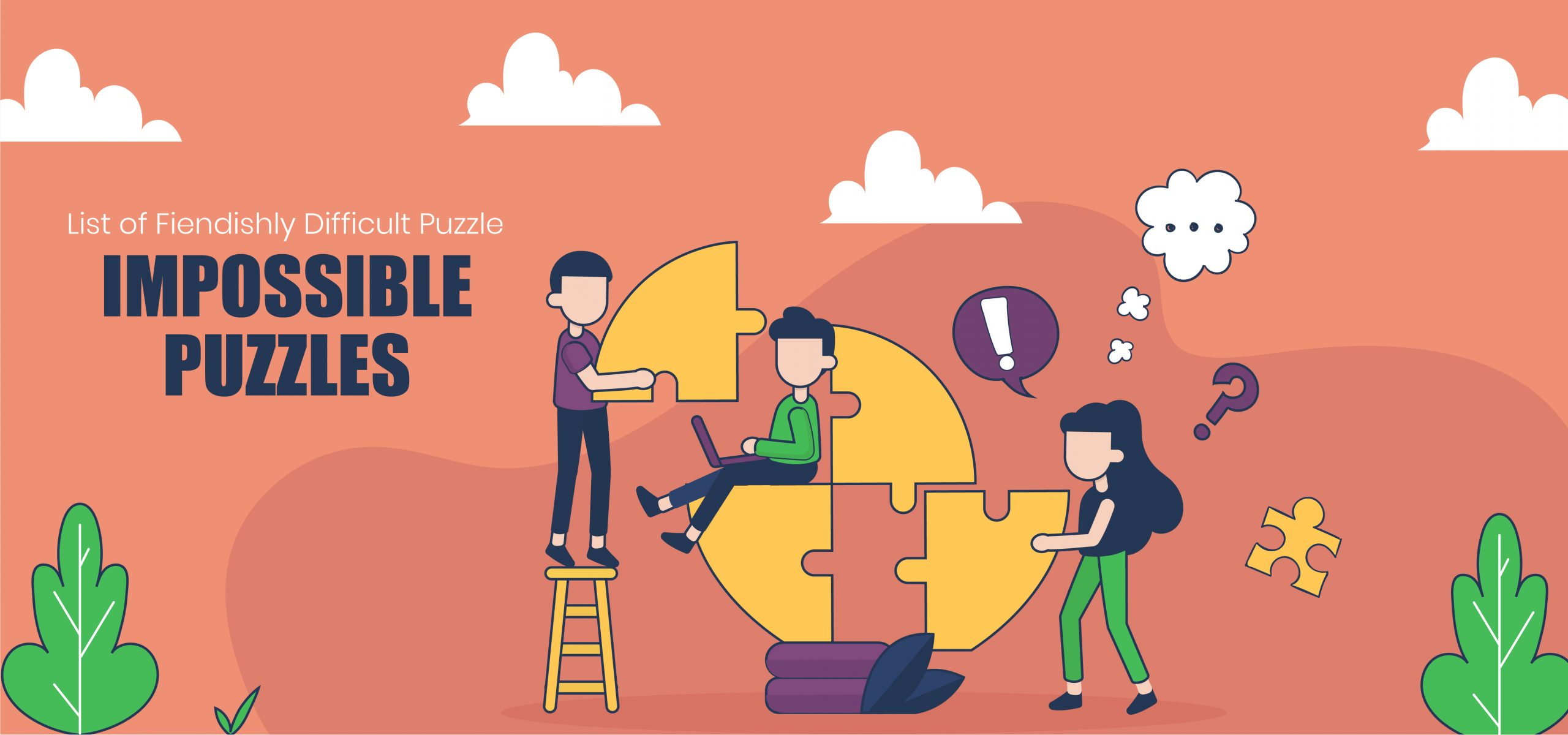-
Brain Games: Mental Workouts for a Sharp and Healthy Mind

Let’s start with this simple question: do you take time out — let’s say an hour or so every day — to deliberately work on your mental efficiency?
Well, most people don’t.
In fact, with the busy schedule and the kind of sleep-deprived lifestyle we live, it makes it impossible.
But the thing is — working on your brain’s health is extremely crucial to improve cognitive function and slowing down the risks of aging on your brain. Our brains work a lot like muscles. You need to strengthen it, challenge it, and stretch its capabilities. You have to use it or you’ll lose it. As simple as that.
That’s when mental stimulation and brain games come in. They are a fun and easy way to challenge and exercise your brain. The best part — you don’t have to spare deliberate time for these games. You can play them on the go — on a commute, on a lunch break, or on weekends with friends and family and the rewards are wonderful.
So What Are Brain Games?
Brain games are activities intended to sharpen thinking skills and improve cognitive abilities by stimulating your brain. Consider these games as mental workouts that help you enhance mental performance — such as processing, reaction time, quick decision making, focus, attention, and memory.
If you have ever played chess or tried to solve crosswords, word scrabble, Sudoku, Rubix Cube, or any riddles and brainteasers you know how it feels. It’s challenging. It’s stimulating. It makes you scratch your head.
Now, these brain games can further be divided into two types. One that triggers your logical thinking and the other one tapping the lateral one.
The logic-based games encourage an analytical approach to solve the problem — the kind of we use while solving a math problem. While for the lateral thinking approach you need to utilize creativity and out-of-the-box thinking.
A dose of both lateral and logical thinking games can help you to be analytical and creative at the same time.
How Brain Games Impact Cognitive Functioning?
For this, let’s quickly understand how our brain works.
Our brain is like a computer. But just a lot better.
When a computer receives periodic software updates, the specifications and hardware it came with remain the same. But our brain has the ability to even update its hardware along with the software.
When you learn or experience something new, your brain creates new connections between neurons (neurons are the brain cells that form our brain) and changes its neuronal structure.
So when you expose your brain to new experience, environment, work, or challenges, you are rewiring your brain with new neuron connections.
This phenomenon is known as neuroplasticity. The term coined by Polish neuroscientist Jerzy Konorski to describe changes in neurons in our brain with new experiences.
It means your brain has the ability to change. It can adapt to new situations. And even get better — but the question is how would you do it?
(You guessed it) Brain games.
Brain games stimulate our mind, challenge our thinking, and encourage us to come up with novel ways to solve problems. They are an opportunity to train the mind, sharpen and rewire it with some quick and fun activities.
Another way brain games enhance your mind is by helping to build cognitive reserve.
To put it simply, cognitive reserve is the brain’s ability to maintain the cognition function and even improvise to solve problems. It also provides resilience against risks of developing age-related cognitive weakness such as memory loss and debilitating verbal and reasoning ability.
Research shows that moderate-intensity physical exercise that increases blood flow to the hippocampus (memory storage region in the brain) can help you build the cognitive reserve. But combining it with some kind of brain games and activities that stimulate the brain can further expand the benefits.
Some Brain Games You Can Start With
1. Stroop Colour Effect
Stroop color effect occurs when you recognize the color of the word rather than its semantic meaning. For example, the word “yellow” is printed in orange, and you must recognize and say the color of the text rather than the word.
Here, try it yourself. Say the color of the words — not the semantic meaning — in the following graphic.
 Could you do it without any mistakes? No, right? The reason being the meaning of the words conflicts with your brain to recognize the color and thus challenges your brain.
Could you do it without any mistakes? No, right? The reason being the meaning of the words conflicts with your brain to recognize the color and thus challenges your brain.This works on two things — your selective attention skills and speed of processing.
Selective attention skills: Your brain requires more attention to name the color of the text than simply reading the word.
Speed of processing: How fast is your brain’s processing speed to register the color information of the word with a different meaning.
2. Jigsaw Puzzles
Jigsaw puzzles are fun and at the same time an excellent brain game to train your mind. There are a number of skills you work on while solving the jigsaw puzzle — such as problem-solving skills, logical thought process, and reasoning abilities.
Fun fact: Bill Gates likes to tinker away puzzles and usually carries one while on vacation and holidays.
While solving a jigsaw puzzle, you are stimulating your brain to memorize the shapes and colors of the pieces so that you can fit it together to form a bigger picture.
When you do this repeatedly, searching each piece, you are working on your short-term memory. It is also a perfect game to stimulate both the left and right brain tapping the logic and creative part at the same time.
Research suggests that such brain games enhance spatial skills and memory retention and also can reduce the likelihood of developing Dementia and Alzheimer’s.
Want to give it a try?
3. Lateral Thinking Puzzles
Lateral thinking is creative problem solving — to come up with ideas and solutions that challenge the preconceived concepts.
It is the answer to the question:
“Why do some people always have new ideas while others of equal intelligence never do?”
Thus training your lateral thinking is equally vital as your logical thinking. And you can practice it with quick and fun lateral thinking puzzles.
Lateral thinking puzzles include riddles and unusual scenarios with some information from which you find an answer. You need a novel way of thinking and looking at situations from a different angle to solve it. Here, check if you can solve these lateral thinking puzzles.
-
The 19th and 22nd presidents of a country had the same mother and father but were not brothers or sisters. How can this happen?
-
How could a baby fall out of a twenty-story building onto the ground and live?
-
Three switches outside a windowless room are connected to three light bulbs inside the room. How can you determine which switch is connected to which bulb if you are only allowed to enter the room once?
(Answers at the end of the article.)
4. Word Games
Word games such as word scramble and crosswords are timeless games that have been played for decades and have wonderful benefits.
A crossword puzzle is a great game to start with that’ll help you improve your critical thinking skills by interpreting the clues and finding answers to complete the puzzle.
It’s also a fun way to learn new facts and enhance your vocabulary. Scrabble is another great word game that stimulates your mind while unscrambling the letters to form words from a standard dictionary or lexicon.
Here’s some exercise to get started.
Rearrange the letters to find the name of the colors.
- WLLOEY
- ILTOVE
- WTIEH
- BWRNO
- GENER
- IPNK
- LVDERAEN
- TSQRUOUEI
- SOCRIMN
If you were able to easily unscramble the above letters, here’s some advanced level of exercise.
Try to find out as many words you can from the following letters:
10. EATNRPH
Bonus if you can find a seven-letter word from this word scramble. Hint: It’s related to a Marvel superhero.
Answers
Lateral Thinking Puzzles
- The same president was serving another term in office.
- The baby fell out of a ground floor window.
- Switch on the first switch, leave it for a few minutes, and then switch it off. Now switch on the second one and enter the room. The second switch will be connected to the bulb that is turned on, the first switch will be connected to the warm bulb, and the third switch will be connected with the cold bulb.
Word Games
- YELLOW
- VIOLET
- WHITE
- BROWN
- GREEN
- PINK
- LAVENDER
- TURQUOISE
- CRIMSON
- The seven-letter word is PANTHER
 3927
3927
-







